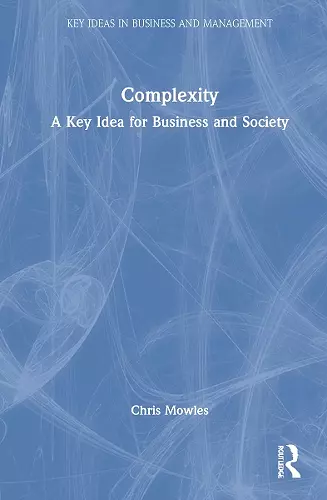Complexity
A Key Idea for Business and Society
Format:Hardback
Publisher:Taylor & Francis Ltd
Published:30th Nov '21
Currently unavailable, and unfortunately no date known when it will be back
This hardback is available in another edition too:
- Paperback£34.99(9780367425685)

This book interprets insights from the complexity sciences to explore seven types of complexity better to understand the predictable unpredictability of social life. Drawing on the natural and social sciences, it describes how complexity models are helpful but insufficient for our understanding of complex reality.
Taking an interdisciplinary approach, the book develops a complex theory of action more consistent with our experience that our plans inevitably lead to unexpected outcomes, explains why we are both individuals and thoroughly social, and gives an account of why, no matter how clear our message, we may still be misunderstood. The book investigates what forms of knowledge are most helpful for thinking about complex experience, reflects on the way we exercise authority (leadership) and thinks through the ethical implications of trying to co-operate in a complex world. Taking complexity seriously poses a radical challenge to more orthodox theories of managing and leading, based as they are on assumptions of predictability, control and universality. The author argues that management is an improvisational practice which takes place in groups in a particular context at a particular time. Managers can influence but never control an uncontrollable world. To become more skilful in complex group dynamics involves taking into account multiple points of view and acknowledging not knowing, ambivalence and doubt.
This book will be of interest to researchers, professionals, academics and students in the fields of business and management, especially those interested in how taking complexity seriously can influence the functioning of businesses and organizations and how they manage and lead.
"That our lives become increasingly complex is part of our common experience. How to navigate complexity, however, is another matter. It is here where we need reliable and insightful guides. Chris Mowles has provided such a brilliant guide. True to form, this is a multi-dimensional guide, ranging from the self, trough organizations, to the world at large. With every chapter, the reader is encouraged to complexify his/her understanding – new ideas and questions crop up, judgment is sharpened and a new sensibility emerges. This is an highly enlightening book fit for our challenging times." Haridimos Tsoukas,University of Cyprus and University of Warwick, UK.
"Chris Mowles provides us with a useful antidote to the notion that complexity thinking can solve 'wicked problems'. This book takes seriously the social relations which shape organisations, and people's day to day lived experience. It provides readers with different ways of thinking about continuity and change, and some very practical ways in which managers and leaders can behave differently." Chris Roche,Professor of Development Practice and Director of the Institute for Human Security and Social Change at La Trobe University, Australia.
"Professor Mowles’ work offers those who care about organizational life the chance to consider the impossibility of controlling outcomes or predicting the future. Within his descriptions and stories of leading and participating, I have found a rewarding and refreshing invitation to pay more attention to the present, to value emotion, confusion or difference and be re-invigorated when collective thought and discovery result in changed minds and renewed agreements for action. " Cathy Risdon,Professor and Vice Chair, Director, Health Services, McMaster University, Hamilton, Canada
"Over the past few years, there has been a major shift in the research culture of universities. Research fundamentally motivated by innate human curiosity has been subjugated to research driven by strategic objectives chosen by university management. Researchers are fired because they do not align with strategic objectives, because they dare to critique management orthodoxy. Chris Mowles’ book is extremely important because it resists this destructive trend and makes a serious contribution to keeping critical management traditions alive." Ralph Stacey,founder of the Doctor of Management programme at the University of Hertfordshire, UK
"Complexity science is often presented as a superficial means of joining up dots. Not here. Complexity contributes to interrogating what is seemingly ‘obvious’ (e.g. individual sovereignty) or ‘normal’ (consumerism). Crucially, Mowles connects awareness of complexity to processes of critical reflection. He shows how, as a ‘key idea’, complexity can contribute to developing forms of action that are less naïve and self-defeating." Hugh Willmott,Professor of Management, City University London, UK
"In this timely volume, Chris Mowles distils perhaps the most important lesson of complexity thinking: in an uncontrollable world, success comes less through our attempts to design it than through the quality of our participation in it. This book will lead you through the implications of this insight for many spheres of organizational and social life, from power and communication to self-understanding and judgment." Andrey Pavlov, Professor of Strategy and Performance, Cranfield University, UK
"This book poses a radical challenge to more orthodox theories of managing and leading. Mowles takes this further by investigating what forms of knowledge are most helpful consistent with our experience that our plans inevitably lead to unexpected outcomes. Management is seen as an improvisational practice that can influence, but never control an uncontrollable world. There are ethical implications for both too much and too little authority." Peter Karnøe, Professor at the Department of Planning, Aalborg University, Copenhagen, Denmark.
"Why is it that we crave certainty when all around us we see unfathomable complexities? Chris Mowles argues that the models and frameworks that offer us the comforts of certainty can never fully answer this question. We must also develop social practices that guide us in taking resilient actions. He brings his argument vividly to life by drawing on examples from the global COVID-19 pandemic. Lessons learned are every bit as relevant to other crises, whether they are approaching, or indeed are already upon us." Barbara Simpson, Professor of Leadership and Organisational Dynamics, University of Strathclyde, UK
ISBN: 9780367433857
Dimensions: unknown
Weight: 417g
188 pages